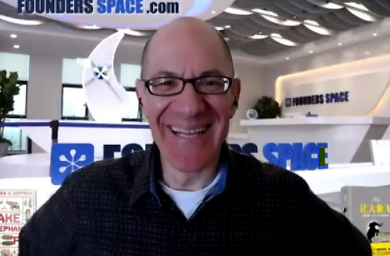
Any business that fails to innovate is doomed to die. The good news is that radical innovation is within reach for any company of any size. It just requires the right approach.
Silicon Valley venture capitalist Steve Hoffman shared the secrets of that approach recently in a virtual presentation for UCR School of Business students, prospective students, alumni, faculty and partners.
Hoffman is CEO & chairman of Founders Space, one of the world’s leading startup incubators and accelerators, with more than 50 partners in 22 countries. He has written several books, including Make Elephants Fly, and has worked with hundreds of startup founders, CEOs and other venture capitalists.
Speaking during a virtual presentation hosted by the School of Business, Hoffman said his experience has shown him that, more than ever, innovation must be a continual process.
“If you're a small company or a big company, or whether you're a traditional business or a new start-up, it doesn't matter,” he said. “If you don't innovate, you are going to die. You might not die right away. It could take a decade, but you will be out-competed. And this cycle, this innovation cycle, is actually happening faster than it's ever happened in the past.”
In his presentation, which can be viewed in its entirety here, Hoffman described innovation as a mindset that does not require big teams or big budgets–but does require an insistence on questioning assumptions and a willingness to learn from failures.
Question Everything
Hoffman advises entrepreneurs to start innovating by challenging their own beliefs, along with those of team members, competitors, and strategic partners.
“As soon as we say to ourselves, ‘That's the way it’s done; that works,’ then we shut off possibility,” he said.
Think Big, Start Small
Citing the bold thinking of Tesla CEO and SpaceX founder Elon Musk and the “moonshot” philosophy at Google, Hoffman acknowledged the power of big ideas to push into areas that seem impossible but are where the most revolutionary change happens.
At the same time, he said, many of the biggest ideas that get the most attention actually started out as small projects. Hoffman gave the example of Google, which began as a small startup by some graduate students who envisioned a better way to find research papers on the internet.
“So, when you’re innovating, do not kill those small projects. Please do not kill them,” he said. “Because if you kill the small projects, you may be killing your best ideas.”
Small Teams, Small Scope, Small Budgets
Another key to successful innovation is keeping the team small, Hoffman said. Anything larger than 10 people leads to decision by consensus, confusion, and inefficiency. Even large companies rely on small innovation teams, he said, citing the “two-pizza rule” by Amazon founder and CEO Jeff Bezos: If you can’t feed your team with two pizzas, it’s too big to innovate.
Similarly, Hoffman advises against trying to do too much with innovation. Figuring out what your customers need is more important than complicated features. Simplicity itself is a “killer feature,” he said. He also warned that too much funding can make innovation teams lazy and inefficient instead of diving directly into the work. It also can lead to too much hiring – conflicting with the ideal of small innovation teams.
It’s also important to reduce the time from hypothesis to design and data collection and analysis. “You want to reduce the iteration time to as small as possible,” he said, noting that innovation is not a straight line.
Picking the Right People
Contrary to what most people believe, he said, the key to innovation is not the idea itself–it is the people behind the idea.
“Even if you take a great idea that is sure to be a mega hit, and you put this idea on a bad team, a team that really aren't innovators, they will bungle the job. They will fail,” he said.
The team needs an innovation lead, someone who questions everything, who never gives up. It also needs someone who can inspire, who can help people see the vision. These should also be dedicated teams–part-time innovation rarely works.
Adventure, Failure and the Unknown
Innovation is the process of continual failure–trying something, figuring out why it doesn’t work and moving on the next step, Hoffman said.
“Encourage your team to explore,” he said. “Innovation is a journey. It's a crazy journey. And it's a journey into the unknown. And the only way to go into the unknown is to go beyond everything you know, and just start fumbling around because that’s what innovators do.”
School of Business organizers thanked Hoffman for sharing his insights and noted plans for additional virtual events to be held quarterly the rest of the year.
